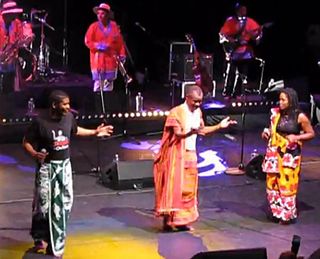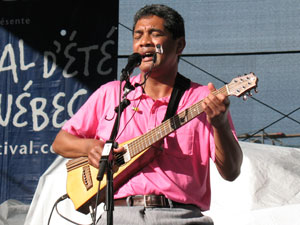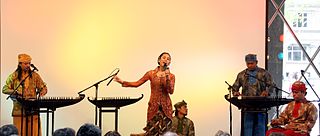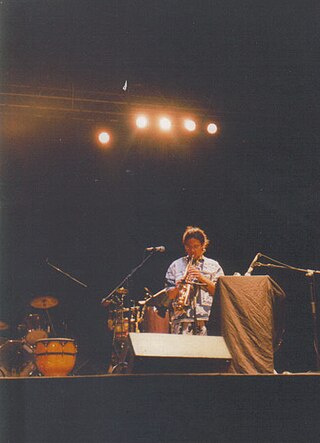Notes
- ↑ All Music
- ↑ Liner notes, Soul Makassar, 2001
- ↑ National Geographic World Music site Archived 2006-11-14 at the Wayback Machine
- ↑ TIME.com - Music Goes Global
Tarika | |
|---|---|
| Origin | Madagascar |
| Genres | World music, Malagasy roots music |
| Instrument(s) | marovany, valiha, kabosy, jejy voatavo |
| Years active | 1993-present |
| Labels | Xenophile |
| Members | Hanitra (Rasoanaivo Hanitrarivo) Noro (Raharimalala Tina Norosoa) Donné (Randriamanantena Dieudonné) Ny Ony (Rasolomahatratra) Ny Ony (Henintsoa Andriamparany) Solo (Randrianasolomalala Victor) |
| Website | www.Frootsmag.com/Tarika |
Tarika (Malagasy for "group") is a musical group from Madagascar. The group's predecessor, Tarika Sammy, formed in the 1980s, but as Tarika they debuted in 1993. At that point they had relocated to London. Their second album Son Egal was a collaboration with Senegal musicians and dealt with the 1947 Malagasy Uprising in Madagascar. [1] Otherwise, much of Tarika's music is based on musical tradition; for example, the album D focused on dance music. Their 2001 album Soul Makassar dealt with the musical connections between Indonesia and Madagascar. [2]
Tarika is led by two sisters, Hanitra and Noro. Hanitra has engaged in creating an arts center in recent years. [3] In 2001, TIME magazine included Tarika in a list of the "10 best bands on planet Earth". [4]

The highly diverse and distinctive music of Madagascar has been shaped by the musical traditions of Southeast Asia, Africa, Oceania, Arabia, England, France and the United States over time as indigenous people, immigrants, and colonists have made the island their home. Traditional instruments reflect these widespread origins: the mandoliny and kabosy owe their existence to the introduction of the guitar by early Arab or European seafarers, the ubiquitous djembe originated in mainland Africa and the valiha—the bamboo tube zither considered the national instrument of Madagascar—directly evolved from an earlier form of zither carried with the first Austronesian settlers on their outrigger canoes.

Tony! Toni! Toné! is an American soul/R&B band from Oakland, California, popular during the late 1980s and early to mid-1990s. During the band's heyday, it was composed of D'wayne Wiggins on lead vocals and guitar, his brother Raphael Saadiq on lead vocals and bass, and their cousin Timothy Christian Riley on drums, keyboards, and background vocals. Originally, the band went by "Tony, Toni, Toné" as a joke, until they realized it "had a nice ring to it".

"Ry Tanindrazanay malala ô!" is the national anthem of Madagascar. The lyrics were written by Pasteur Rahajason, and the music by Norbert Raharisoa. It is similar to a march and was strongly influenced by European music and the French colonial education system. It is often played by Malagasy musicians on the accordion.

A Sodina is a woodwind instrument commonly played in Malagasy music and a member of the aerophone family of instruments. Similar in structure and sound to a flute, the sodina is usually made out of bamboo, lightwood, plastic, or reed and varies in size depending upon the region it is being played in.

Salegy is a popular music genre from Madagascar. Originating as a Sub-Saharan African folk music style in the northwestern coastal areas of Madagascar, modern salegy is the genre of Malagasy music that has gained the widest recognition and commercial popularity in the international market. Its sound is considered emblematic of the island. Eusèbe Jaojoby, a Sakalava singer from Anboahangibe, was a key originator of the style and is widely considered the "King of Salegy".

Eusèbe Jaojoby, commonly known by his surname Jaojoby, is a Malagasy composer and singer of salegy, a musical style of northwestern Madagascar. Critics consider him to be one of the originators of the modern salegy style that emerged in the 1970s, and credit him with transforming the genre from an obscure regional musical tradition into one of national and international popularity. Jaojoby also contributed to the creation of two salegy subgenres, malessa and baoenjy. Jaojoby has been called the most popular singer in Madagascar and the Indian Ocean islands, and is widely referred to as the "King of Salegy". His success has earned him such honors as Artist of the Year in Madagascar for two consecutive years (1998–1999) and the role of Goodwill Ambassador for the United Nations Population Fund in 1999.
Randriamananjara Radofa Besata Jean Longin is a Canadian-Malagasy folk and blues guitarist, who records and performs under the stage name Madagascar Slim. He is a member of the folk music band Tri-Continental and the world music group African Guitar Summit, as well as a solo artist and a regular collaborator with blues singer Ndidi Onukwulu.

The culture of Madagascar reflects the origins of the Malagasy people in Southeast Asia, East Africa and Oceania. The influence of Arabs, Indians, British, French and Chinese settlers is also evident.

Solo Razafindrakoto known as Solorazaf is a Malagasy guitarist born in France. His roots are both situated in Madagascar. His musical style is very much influenced by these two different cultures and he then created a very personal musical style based on Malagasy traditional music.
Raymond Razafimbahiny (1919–1963), also known as R.R. Majunga, was an artist from Madagascar. He was among the premier, if not the leading, bilingual (French/Malagasy) composers and pianists of his era. Additionally, he was a poet, a classically trained violinist, and a self-taught pianist. R.R. Majunga's life story and development as a composer are closely intertwined with Madagascar's birth as a nation, encompassing the colonial period, the rebellion against French rule, the attainment of independence, and the early years of independence. He tragically lost his father, who was tortured, shot, and eventually buried in a mass grave by the French colonial government due to his involvement in the resistance movement. At the time of his father's death, Raymond Razafimbahiny found himself as a young adult responsible for his family and numerous younger siblings as he ventured to the town he believed held great promise: Majunga, which is considered by many to be the heart of Madagascar. Adding further complexity to his life story is the time he spent fighting on behalf of France in the Indochina War and Algeria.

SambaSunda is an Indonesian ethnic music fusion group based in Bandung, the capital and cultural centre of Sundanese culture, Indonesia. SambaSunda are a 14-piece ensemble bringing together a pan-Indonesian array of instruments and influences to create a new style gamelan orchestra. Their style mainly influenced by Sundanese culture such as gamelan and degung Sunda, Tembang Sunda and Kacapi suling.

Philibert Rabezoza, better known by the name Rakoto Frah, was a flautist and composer of traditional music of the central highlands of Madagascar. Born in 1923 near the capital city of Antananarivo to a poor rural family, Rakoto Frah surmounted the challenges posed by his underprivileged origins to become the most acclaimed 20th century performer of the sodina flute, one of the oldest traditional instruments on the island. Through frequent international concerts and music festival performances, he promoted the music of the highlands of Madagascar and became one of the most famous Malagasy artists, both within Madagascar and on the world music scene.

Nicolas Vatomanga Andrianaivo Rakotovao, known as Nicolas Vatomanga is a Malagasy saxophonist, flutist, bandleader and composer. His music combines elements of jazz, blues and traditional musics of Madagascar, including: the hira gasy of the Centre, the beko from the South and the salegy from the North of the Great Island.

Paul Bert Rahasimanana, better known as Rossy, is a Malagasy singer and songwriter, generally considered the most popular Malagasy artist of the 1990s. Beginning his musical career as an accordionist and singer within a traditional hira gasy musical troupe, Rossy innovated a fusion of hira gasy instrumentation and vocal style with contemporary rock, funk and folk sounds to create a uniquely Malagasy genre of contemporary popular music. Rossy actively promoted former president Didier Ratsiraka through concert performances throughout his presidency and served within the Ministry of Culture to promote artists' rights and copyright law. When Ratsiraka fell into disfavor following the contentious 2001 Malagasy presidential elections, Rossy went into self-imposed exile in France. He returned to the island to give concerts beginning in 2008 and enjoyed enormous popularity despite six years of absence, setting an unbroken record of 35,000 tickets sold for a performance given that year. His compositions and style are frequently associated with the Ratsiraka socialist period and commonly evoke a sense of nostalgia among Malagasy fans.

Samoëla Rasolofoniaina, better known as Samoëla, is a Malagasy vocalist and composer of contemporary folk fusion and roots music that draws upon musical traditions throughout the island of Madagascar. He typically sings and plays acoustic guitar, accompanied by an ensemble including bass guitar, Western and traditional percussion, and backup singers. He is distinguished by his use of hainteny traditional poetry and its metaphorical language, as well as youth slang and culturally subversive direct language to critique and address sensitive social and political topics.

Mahaleo is a folk-pop band from Madagascar that is widely viewed as the most popular Malagasy group of all time. The band was founded by Dama with six of his classmates after first performing together during the rotaka student protests at their high school on 13 May 1972. Mahaleo's lyrics draw upon the indirect language of traditional hainteny and ohabolana to expose contemporary political and social issues and invite listeners to identify their own solutions.
Tsiliva, born Christophe Tsiliva Diddiot, is a Malagasy musician who performs kilalaka, a traditional genre of music from the southwestern interior of Madagascar. The son of a pastor, he was born on 25 July 1982 and raised in the western coastal town of Ambovombe Androy, near Morondava. As a child he enjoyed playing music and composing songs. Upon reaching secondary school, he formed or joined many local groups, including Cabalero Music, Tsirangoty, Diddiot Pro, Calypso, Mentalis Music and Fouad music, with whom he both performed and composed music. After graduating high school and earning his baccalaureat in management and communications, he played bass for the group Dadah de Fort Dauphin, later joining the groups Terana and Terakaly as a percussionist. With Terakaly, he performed for the first time at a major music festival, the Donia music festival at Nosy Be.
Oladad is a hip-hop folk-fusion group from Madagascar. They perform a fusion of hip-hop, dance and the traditional horija music of the Betsileo people, including such instruments as the kabosy, jejy, sodina and fiddle. The band was formed in 1996 in Fianarantsoa. The band draws its name from the reverse spelling of the name of lead member Dadalo, whose name signifies "luck". Oladad comprises five singers and six musicians.

Ramilison Besigara, also known as Dadamily Besigara, was a Malagasy hiragasy troupe leader from Fenoarivo in the central highlands of Madagascar. His troupe, Tarika Ramilison Fenoarivo, featured his daughter, Perline, as a singer and dancer. Over two dozen singers, dancers and traditional musicians performed in the troupe. Tarika Ramilison Fenoarivo was in high demand to perform at famadihana reburial ceremonies and other traditional events in the highlands.

Son Egal is the second album by the Malagasy band Tarika, released in 1997. It was the band's first widely distributed album. Tarika promoted it with a two-month North American tour. Son Egal was a hit in Madagascar, as well as on American and European world music charts.